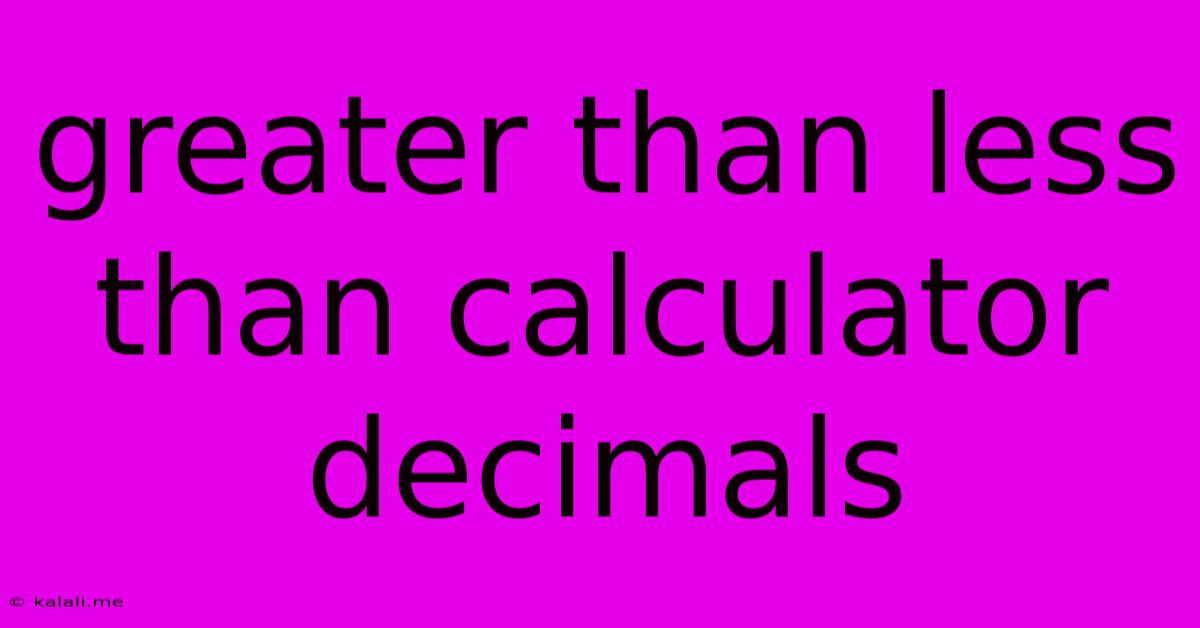Greater Than Less Than Calculator Decimals
Kalali
Jun 14, 2025 · 3 min read

Table of Contents
Greater Than, Less Than Calculator: Mastering Decimal Comparisons
Are you struggling with comparing decimals? Do you need a quick and reliable way to determine whether one decimal number is greater than, less than, or equal to another? This article provides a comprehensive guide to understanding decimal comparisons and introduces the concept of a "greater than less than calculator" – a tool that simplifies this process. We'll explore the underlying principles, offer practical examples, and highlight why mastering decimal comparisons is crucial in various fields.
Understanding Decimal Numbers
Before we delve into comparing decimals, let's refresh our understanding. Decimal numbers represent fractions where the denominator is a power of 10 (10, 100, 1000, etc.). The decimal point separates the whole number part from the fractional part. For example, in the decimal 23.45, '23' is the whole number part and '.45' represents 45/100.
Comparing Decimals: The Basics
Comparing decimals involves determining which number is larger or smaller. Here's a step-by-step approach:
-
Align the decimal points: This is crucial. Write the numbers vertically, ensuring the decimal points are directly above each other.
-
Compare whole number parts: Start by comparing the whole numbers. The number with the larger whole number is greater.
-
Compare decimal parts: If the whole numbers are equal, move to the tenths place (first digit after the decimal point). Compare the digits. If they are equal, continue comparing the hundredths place, thousandths place, and so on.
-
Determine the relationship: Based on the comparison, you can conclude whether one number is greater than (>), less than (<), or equal to (=) the other.
Example:
Let's compare 3.456 and 3.46.
-
Align the decimal points:
3.456 3.460 (Adding a zero doesn't change the value) -
Whole numbers are equal (both are 3).
-
Comparing tenths: Both are 4.
-
Comparing hundredths: 6 is greater than 5.
Therefore, 3.46 > 3.456
The Role of a Greater Than Less Than Calculator
While manual comparison is straightforward for simple decimals, it can become tedious with more complex numbers or when dealing with a large number of comparisons. This is where a "greater than less than calculator" (often integrated into online calculators or spreadsheet software) becomes invaluable. These tools automate the comparison process, providing instant results and reducing the risk of human error. Simply input the two decimal numbers, and the calculator will accurately determine the relationship.
Applications of Decimal Comparisons
Mastering decimal comparisons is essential in many areas, including:
- Finance: Comparing prices, interest rates, and investment returns.
- Science: Analyzing experimental data, measuring quantities, and interpreting scientific results.
- Engineering: Designing and constructing structures, calculating dimensions, and ensuring precision.
- Everyday Life: Comparing prices in a store, measuring ingredients in cooking, and understanding data in various contexts.
Conclusion:
Understanding how to compare decimals is a fundamental mathematical skill with wide-ranging applications. Although manual comparison is feasible, a greater than less than calculator offers a convenient and efficient solution, especially when dealing with more complex numbers or large datasets. By mastering this skill, you'll improve your ability to analyze data, solve problems, and make informed decisions in various aspects of your life and work.
Latest Posts
Latest Posts
-
Example Of Solid Dissolved In Solid
Jun 14, 2025
-
Air Pressure At Sea Level Is Equal To
Jun 14, 2025
-
What Is The Opposite Of Reluctant
Jun 14, 2025
-
Brass Is A Mixture Of What
Jun 14, 2025
-
Which Of The Following Are Pure Substances
Jun 14, 2025
Related Post
Thank you for visiting our website which covers about Greater Than Less Than Calculator Decimals . We hope the information provided has been useful to you. Feel free to contact us if you have any questions or need further assistance. See you next time and don't miss to bookmark.